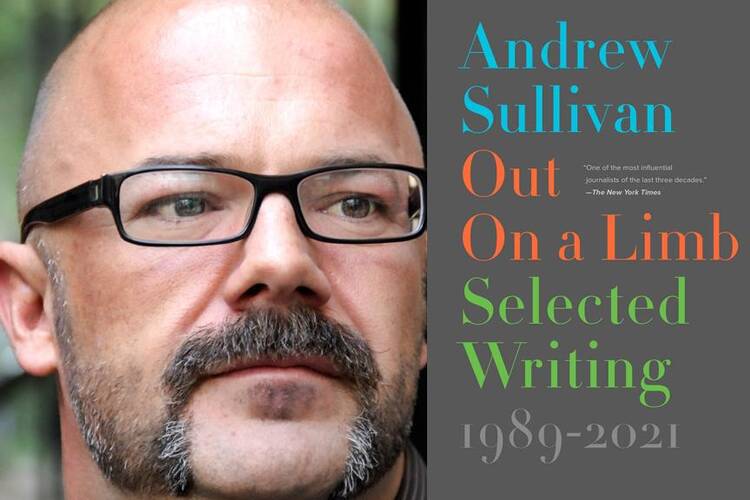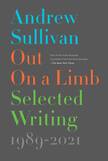Andrew Sullivan’s writing on faith, sexuality and culture wars
Considerable ink and energy have been spent in the pages of countless journals on that special creature known as the “Catholic writer.” Google the term and you will be inundated with search results from Augustine and Aquinas to modern giants both departed—Flannery O’Connor and Dorothy Day—and still among us: Alice McDermott, Garry Wills and numerous others.
Reading Andrew Sullivan’s collection Out on a Limb: Selected Writing, 1989-2021, prompted my recent Google search. I’d never heard Sullivan mentioned in those conversations about Catholic writers, so I wasn’t surprised when his name did not appear. But the omission prompted two questions: Why wasn’t he there? And why wasn’t I surprised?
The answer to both is obvious. Sullivan has unapologetically identified as both gay and Catholic for decades (he married his husband in 2007). But if that is disqualifying, the loss is clearly ours. Sullivan has written with such depth and insight about the experience of sexuality and faith for so long that it is difficult not to see his journey as taking place on holy ground. If he is not sufficiently Catholic, it isn’t because of doctrine or orientation; the fault is in our impoverished imaginations.
Not that Sullivan himself would care. He has spent his entire career as an outsider. He was an openly gay neocon Reaganite when that administration would not even mention the word AIDS. In 1989, Sullivan wrote a landmark essay making the case for the legalization of same-sex marriage back when many L.G.B.T.Q. activists believed the idea was a pathetic capitulation to heterosexual norms. Sullivan has a clear comfort with contradiction that makes it difficult for readers to know where to place him. Is he a gay writer? A conservative writer? A conservative apostate? All we know for sure is that, according to Google, he’s not a Catholic writer.
Out on a Limb documents a man thinking out loud and manifests all the contradictory qualities that have made Sullivan occasionally frustrating but invariably worth reading for years. A darling of the right in the 80s, he was later disavowed by Republicans for criticizing the G.O.P.’s fearmongering and intellectual dishonesty.
If Andrew Sullivan is not sufficiently Catholic, it isn’t because of doctrine or orientation; the fault is in our impoverished imaginations.
Sullivan’s ability to be flexible in his thinking is disarming and rare among the pundit class. His arguments are intelligent and well constructed even when they have been misguided. Looking back, Sullivan now sees his “shamefully excessive defense” of George W. Bush’s invasion of Iraq as his “greatest failure of judgment.”
He can also be frustratingly blind to his own contradictions. Sullivan laments the devolution of conservatism during the 1990s and 2000s but seems not to question the underlying principles of the Reagan/Thatcher axis that gave birth to that next generation. His fond recollections of that era sound at times like uncritical exercises in political fantasy, fueled by overheated Cold War fears and simplistic assumptions about the virtues of free market capitalism.
Sullivan’s conservatism is grounded in the thinking of the British philosopher Michael Oakeshott (1901–90), who argued for a “politics of skepticism” that is nonideological and decidedly not utopian, generally preferring decentralized governments and minimal intervention. One wonders how that noninterventionist, epistemological humility regarding change translates among African Americans, Native Americans and others whose patience for justice has been measured in centuries. And how does it challenge market-based assumptions about economic justice in a world with disastrous wealth disparity?
Out on a Limb manifests all the contradictory qualities that have made Sullivan occasionally frustrating but invariably worth reading.
Perhaps Sullivan’s most glaring contradiction is that for all of the Oakeshottian texture and nuance he displays regarding L.G.B.T.Q. issues, he seems remarkably tone-deaf on matters of race. In his more recent writing, he is quick to apply dismissive labels like “cultural Marxists” or to weaponize terms like “social justice” or “critical race theory.” Sullivan is a veteran of these culture wars; but surely, someone who has experienced his own marginalization is capable of making more subtle distinctions with regard to the complex, deeply embedded issues of race and identity?
We know this subtlety is possible, because Sullivan’s writing is at its most poignant and layered when dealing with his Catholic faith. In a 1994 article, he recalled confronting his emerging sexuality at 15 while in the Communion line. “‘Please,’ I remember asking almost offhandedly of God, after a quick recital of my other failings, ‘help me with that,’” he writes. Sullivan didn’t even have a name for the sexual awakening he was experiencing.
Sullivan’s evocative understanding of faith and sexuality reveals the heart of the cognitive dissonance so many of us experience in the Catholic church.
“Looking back, I realize that that moment at the Communion rail was the first time I had actually addressed the subject of homosexuality explicitly in front of anyone; and I had brought it to God in the moments before the most intimate act of sacramental Communion…. [Homosexuality] was also something inextricable—even then—from the core of my existence, it felt natural to enlist God’s help rather than his judgment in grappling with it.”
It was a profound moment of recognition that prefigured his understanding of sexuality and faith as core to his very being in the world:
Like faith, one’s sexuality is not simply a choice; it informs a whole way of being. But like faith, it involves choices—the choice to affirm or deny a central part of one’s being, the choice to live a life that does not deny but confronts reality. It is, like faith, mysterious, emerging clearly one day, only to disappear the next, taking different forms—of passion, of lust, of intimacy, of fear. And like faith, it points toward something other and more powerful than the self. The physical communion with the other in sexual life hints at the same kind of transcendence as the physical Communion with the Other that lies at the heart of the sacramental Catholic vision…. My faith existed at the foundation of how I saw the world; my sexuality grew to be inseparable from how I felt the world.
This is a Catholic writer.
Sullivan’s evocative understanding of faith and sexuality reveals the heart of the cognitive dissonance so many of us experience in the Catholic Church. As I discussed eight years ago in these pages, Catholics are better situated than any other group on earth to embrace our L.G.B.T.Q. brothers and sisters simply because—wittingly or unwittingly— we’ve been embracing them for years in our local church communities and schools. They are our family, friends, neighbors, ministers and loved ones. They are us. God’s mercy, forgiveness and grace have already been mediated to us through them in countless ways.
Given the complexity of what we understand about human sexuality, somehow Christians are expected to believe that God created our L.G.B.T.Q. brothers and sisters with attractions and the ability to connect and love that is permitted as long as they aren’t acted on. Can that be what God wants? Does their loneliness or desire for intimacy count for nothing? More importantl, how has the denial of this reality become, for some in the church, what all Christian thought and practice seems to rest on? If that is the sine qua non, did we need the four Gospels? To ask the L.G.B.T.Q. population to deny a central part of their being is like attempting to expunge part of the mystery of creation because of our fear and lack of understanding. It is damaging to both us and them, and it is sinful.
I interviewed the novelist Anne Rice twice in the mid-2000s after she had come back to her Catholic faith. She was devout and very well read in church history and theology. She also had an adult, openly gay son. She believed that the church would get there, but it simply hadn’t yet developed a theology of homosexuality that was consistent with our political, psychological, scientific and social understanding. “I think we will see theology that will embrace gays as the children of God like anyone else,” she said. “Yes, we’re an orthodox religion, but we do go through these changes…. We’ve been going through this long learning period with regard to gay people. It is part of the civil rights movement. It’s part of the scientific revolution…. I think that we will expand and see that our Scripture still has authority, even if we open the doors wide.”
Fifteen years later, Rice’s thoughts remain the best explanation I have heard on the issue. But what do we do until that theology is developed? For many, the doors still are not wide enough to welcome a writer like Andrew Sullivan. To those people I would simply say, “He’s already inside, he’s been here all along and, like it or not, he’s far from alone.”
This article also appeared in print, under the headline “Andrew Sullivan: Catholic Writer,” in the March 2022, issue.











